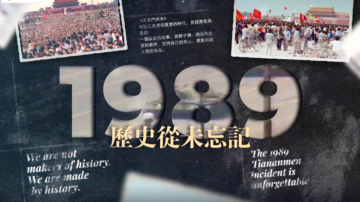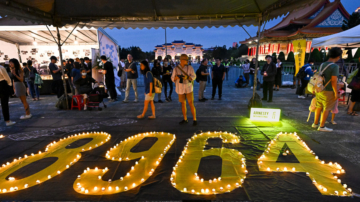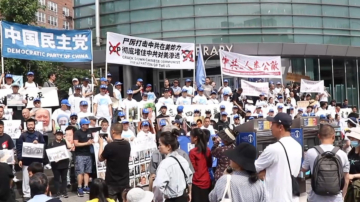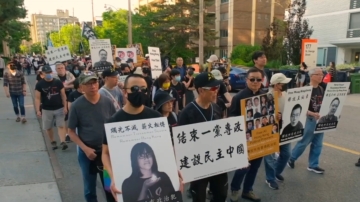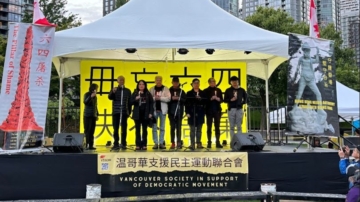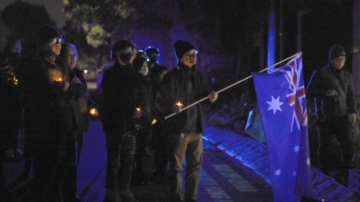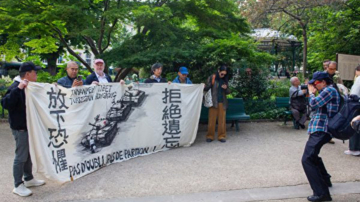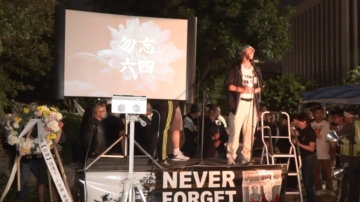【新唐人2014年02月10日讯】今年是“六四”25周年,中共官方出版社日前出版了《央视》前主播薛飞的自传----《我在匈牙利的日子》。薛飞在书中记述了他在“六四”中的遭遇,以及被迫出国后的个人经历。无独有偶,中共最近还放开了因“六四”遭难的前总书记赵紫阳的部分讯息。这是中共有意为“六四”松绑的征兆吗?请看报导。
薛飞的自传是由中共中央级专业出版机构《测绘出版社》出版,上个月中旬开始发售。
当年发生“六四事件”后,薛飞与黄金搭档杜宪因为“黑衣出镜”,被迫转行当编辑。当局还对薛飞约法四条:不许配音、不许出图像、不许外出采访、和当编辑不能署原名等。他计划随队去新疆拍摄风景片,也被新疆当局拒绝,因为怕他从边境“潜逃”。
深受刺痛的薛飞,在1992年远赴匈牙利定居。
薛飞在这部20万言的自传中,描述了他从“原本没想离去”、到“似乎应该离去”、再到“此刻必须离去”的过程,以及他在匈牙利的奋斗史。
而出版社称赞这本书“是广大青年读者砥砺意志,陶冶情操的励志佳作”,“具有很珍贵的阅读收藏价值”。
北京维权人士胡佳表示,薛飞虽受众人瞩目,但他本身在“六四”中所受的迫害却非常普遍。
北京维权人士胡佳 “真实的六四,我认为必须要谈及对于天安门屠杀,对于那场血腥的用坦克、用开花弹、用中越战场上前线下来的军队,来屠戮市民及学生们这样一个事件。”
中共官方出版社出版薛飞自传,胡佳怀疑,这是中共当局释放烟幕来瓦解民间的意志、给自己争取时间和空间的做法。
胡佳认为,如果中共真正想解决“六四”问题,就应该首先解禁与“六四”有关的政治犯,把“六四”的罪魁祸首找出来,但当局并没有这样做。
而目前中共多家门户网站,悄悄解禁前中共总书记赵紫阳部分讯息,包括他的夫人逝世新闻、和纪念赵紫阳逝世九周年短片,以及赵紫阳新闻实录,包括他任内作报告和出访等画面。
另外,民间高调到赵紫阳出生地河南省滑县,公祭赵紫阳,当局虽派出便衣监视公祭活动,并没有加以干扰。
旅美中国社会问题研究人士张健: “任何对中共的幻想都是不正确的。因为在六四的屠杀过程中,中共犯下了太多的罪行,包括反人类罪。它向自己的国民、向自己的学生、手无寸铁的百姓去开枪、去用坦克碾过那些热血青年的身躯的时候,中共已经被宣判,已经被钉在历史的耻辱柱上。”
现居美国的中国社会问题研究人士张健指出,中共独裁政权向来是说一套做一套,当前中共想用民主松动的做法来欺骗民众,已经骗不了人了。
不久前,赵紫阳秘书鲍彤被中共当局警告,在“六四”前,不得接受媒体采访和发表文章﹔而“天安门母亲”成员之一的张先玲,依然被当局监控。
张健: “如果中共真正能放下它过去的罪行,还政于民,让人民自由的站出来去发声,不应该是现在这样一个局面。因为在中共这个体制,每个人都绑在一个邪恶的战车上的时候,中共是无法来自我去赎罪的。”
当年,中共镇压“六四”的当事人,纷纷出书想撇清与“六四”的关系。
前总理李鹏,早年打算出版日记,讲述自己在六四“关键时刻”的所作所为,但被当局否决,后来,有关李鹏六四日记被海外出版,在市面上流传。而在“六四”当时担任北京市长的陈希同,去年也在香港出版自传,公开将“六四屠城”责任推给了邓小平。
采访/常春 编辑/宋风 后制/萧宇
CCP Publishes Xue Fei Biography: Is Ban Lifting on June 4 Incident?
This year will mark the 25th anniversary of the
June 4, or Tiananmen Square massacre, incident.
The Chinese Communist Party (CCP) has recently published
a biography of Xue Fei, a former CCTV news announcer.
The book, entitled “My Days in Hungary”, tells
of Xue Fei’s personal experience during June 4.
It describes how he was forced to move abroad afterwards.
In addition, the party has also partially lifted a ban on
information about former general secretary Zhao Ziyang.
Are these acts signaling a thawing of the regimes
perceptions towards June 4? Let’s take a look.
Xue Fei’s biography was published by
the Surveying and Mapping Press.
This is a central-level publishing organ of the
party. The book was released in mid-January.
During the unfolding of the June 4 in 1989,
Xue Fei and his partner Du Xian had announced
the news on CCTV while dressed in black.
Because of this act, he was moved to work as an editor.
The party also forbade him to do dubbing,
to appear on camera, to perform non-local
interviews and to sign his name on reports.
When he planned to join a team in filming landscapes
in Xinjiang, the provincial authority denied his request.
This was on the grounds of preventing
him from “escaping China across the border”.
Deeply effected by these experiences,
Xue Fei decided to move to Hungary in 1992.
In his 200,000-word biography, Xue described how
his mind changed from “never consider leaving China.”
It moved towards “maybe I should leave”,
and eventually, “I have to leave now”.
The book also includes his story
of continuing struggles in Hungary.
The publisher said Xue’s biography “is an inspirational
work, to help young readers build their character.”
It “is of great value for reading and collecting.”
Beijing human rights activist Hu Jia suggests that although
Xue Fei was a public figure, drawing much attention during
June 4, his persecution was only relatively moderate.
Hu Jia, Beijing Human Rights Activist: “I think
the Tiananmen Square Massacre has to be
mentioned when talking about the truth of June 4.
It was a bloody slaughter of civilians
and students by the party’s army.
They used tanks and shrapnel shells that
had come back from the Sino-Vietnamese War.”
Why has the CCP published Xue Fei’s biography officially?
Hu Jia worries that this was a move to cover-up the incident.
It attempted to ease advocates who seek justice for
victims of the incident, and buy the party more time.
Hu Jia comments that if the CCP really wanted
to solve the issue, the first thing to do was to lift
bans on all political prisoners involved in June 4.
It would seek out the culprits responsible for the
massacre, but the CCP regime is yet to do that.
Recently, several party portal websites discreetly unblocked
information about former general secretary Zhao Ziyang,
This included reports of the death of Zhao’s wife
Liang Boqi’s, and a short memorial film marking
the 9th anniversary of Zhao’s death.
It also included a news chronicle of Zhao, and footage
of Zhao’s lectures and visits to foreign countries.
In addition, Chinese people organized a high-profile
memorial ceremony in Hua County, Henan Province.
This is Zhao’s birthplace. The CCP dispatched plainclothes
officers to observe the event, but they did not interfere.
Zhang Jian, China affair expert: “There
should be no illusion of hope for the CCP.
With the Tiananmen Massacre, the CCP committed
numerous crimes, especially crimes against humanity.
It shot its own citizens, students
and unarmed ordinary people.
Its tank ran over those youngsters’ flesh and blood. With
this act, the party has been conclusively stained with blood.”
Zhang Jian further commented that the CCP
regime always acts differently from what it says.
Now it is no longer able to deceive Chinese people by
releasing some signals of superficial democratization.
Bao Tong, Zhao Ziyang’s former secretary, was recently
warned by the party that he should not agree to any
interviews, or publish any articles in the lead up to June 4.
Zhang Xianling, a member of Tiananmen Mothers,
remains under surveillance by the authorities.
Zhang Jian: “If the CCP can really announce its
previous crimes, and return power to the Chinese
people, giving them freedom of speech, make them
voice freely, China will be a very different place.
The key is that the CCP has attached
all its followers to an evil war machine.
Therefore, is not able to redeem itself because of it’s sins.
Former party leaders involved in June 4 have
attempted to defend themselves by writing books.
Former CCP’s premier Li Peng, had
planned to publish his personal diary.
The diary told his story during critical moments of June 4.
This plan to publish was stopped by the CCP authorities.
However, the diary was later released by
foreign publishers and still came to market.
Chen Xitong, who was the Mayor of Beijing during the
incident, also published biography in Hong Kong last year.
This book publicly blamed the
massacre on Deng Xiaopeng.
Interview/ChangChun Edit/SongFeng Post-Production/Xiaoyu
薛飞的自传是由中共中央级专业出版机构《测绘出版社》出版,上个月中旬开始发售。
当年发生“六四事件”后,薛飞与黄金搭档杜宪因为“黑衣出镜”,被迫转行当编辑。当局还对薛飞约法四条:不许配音、不许出图像、不许外出采访、和当编辑不能署原名等。他计划随队去新疆拍摄风景片,也被新疆当局拒绝,因为怕他从边境“潜逃”。
深受刺痛的薛飞,在1992年远赴匈牙利定居。
薛飞在这部20万言的自传中,描述了他从“原本没想离去”、到“似乎应该离去”、再到“此刻必须离去”的过程,以及他在匈牙利的奋斗史。
而出版社称赞这本书“是广大青年读者砥砺意志,陶冶情操的励志佳作”,“具有很珍贵的阅读收藏价值”。
北京维权人士胡佳表示,薛飞虽受众人瞩目,但他本身在“六四”中所受的迫害却非常普遍。
北京维权人士胡佳 “真实的六四,我认为必须要谈及对于天安门屠杀,对于那场血腥的用坦克、用开花弹、用中越战场上前线下来的军队,来屠戮市民及学生们这样一个事件。”
中共官方出版社出版薛飞自传,胡佳怀疑,这是中共当局释放烟幕来瓦解民间的意志、给自己争取时间和空间的做法。
胡佳认为,如果中共真正想解决“六四”问题,就应该首先解禁与“六四”有关的政治犯,把“六四”的罪魁祸首找出来,但当局并没有这样做。
而目前中共多家门户网站,悄悄解禁前中共总书记赵紫阳部分讯息,包括他的夫人逝世新闻、和纪念赵紫阳逝世九周年短片,以及赵紫阳新闻实录,包括他任内作报告和出访等画面。
另外,民间高调到赵紫阳出生地河南省滑县,公祭赵紫阳,当局虽派出便衣监视公祭活动,并没有加以干扰。
旅美中国社会问题研究人士张健: “任何对中共的幻想都是不正确的。因为在六四的屠杀过程中,中共犯下了太多的罪行,包括反人类罪。它向自己的国民、向自己的学生、手无寸铁的百姓去开枪、去用坦克碾过那些热血青年的身躯的时候,中共已经被宣判,已经被钉在历史的耻辱柱上。”
现居美国的中国社会问题研究人士张健指出,中共独裁政权向来是说一套做一套,当前中共想用民主松动的做法来欺骗民众,已经骗不了人了。
不久前,赵紫阳秘书鲍彤被中共当局警告,在“六四”前,不得接受媒体采访和发表文章﹔而“天安门母亲”成员之一的张先玲,依然被当局监控。
张健: “如果中共真正能放下它过去的罪行,还政于民,让人民自由的站出来去发声,不应该是现在这样一个局面。因为在中共这个体制,每个人都绑在一个邪恶的战车上的时候,中共是无法来自我去赎罪的。”
当年,中共镇压“六四”的当事人,纷纷出书想撇清与“六四”的关系。
前总理李鹏,早年打算出版日记,讲述自己在六四“关键时刻”的所作所为,但被当局否决,后来,有关李鹏六四日记被海外出版,在市面上流传。而在“六四”当时担任北京市长的陈希同,去年也在香港出版自传,公开将“六四屠城”责任推给了邓小平。
采访/常春 编辑/宋风 后制/萧宇
CCP Publishes Xue Fei Biography: Is Ban Lifting on June 4 Incident?
This year will mark the 25th anniversary of the
June 4, or Tiananmen Square massacre, incident.
The Chinese Communist Party (CCP) has recently published
a biography of Xue Fei, a former CCTV news announcer.
The book, entitled “My Days in Hungary”, tells
of Xue Fei’s personal experience during June 4.
It describes how he was forced to move abroad afterwards.
In addition, the party has also partially lifted a ban on
information about former general secretary Zhao Ziyang.
Are these acts signaling a thawing of the regimes
perceptions towards June 4? Let’s take a look.
Xue Fei’s biography was published by
the Surveying and Mapping Press.
This is a central-level publishing organ of the
party. The book was released in mid-January.
During the unfolding of the June 4 in 1989,
Xue Fei and his partner Du Xian had announced
the news on CCTV while dressed in black.
Because of this act, he was moved to work as an editor.
The party also forbade him to do dubbing,
to appear on camera, to perform non-local
interviews and to sign his name on reports.
When he planned to join a team in filming landscapes
in Xinjiang, the provincial authority denied his request.
This was on the grounds of preventing
him from “escaping China across the border”.
Deeply effected by these experiences,
Xue Fei decided to move to Hungary in 1992.
In his 200,000-word biography, Xue described how
his mind changed from “never consider leaving China.”
It moved towards “maybe I should leave”,
and eventually, “I have to leave now”.
The book also includes his story
of continuing struggles in Hungary.
The publisher said Xue’s biography “is an inspirational
work, to help young readers build their character.”
It “is of great value for reading and collecting.”
Beijing human rights activist Hu Jia suggests that although
Xue Fei was a public figure, drawing much attention during
June 4, his persecution was only relatively moderate.
Hu Jia, Beijing Human Rights Activist: “I think
the Tiananmen Square Massacre has to be
mentioned when talking about the truth of June 4.
It was a bloody slaughter of civilians
and students by the party’s army.
They used tanks and shrapnel shells that
had come back from the Sino-Vietnamese War.”
Why has the CCP published Xue Fei’s biography officially?
Hu Jia worries that this was a move to cover-up the incident.
It attempted to ease advocates who seek justice for
victims of the incident, and buy the party more time.
Hu Jia comments that if the CCP really wanted
to solve the issue, the first thing to do was to lift
bans on all political prisoners involved in June 4.
It would seek out the culprits responsible for the
massacre, but the CCP regime is yet to do that.
Recently, several party portal websites discreetly unblocked
information about former general secretary Zhao Ziyang,
This included reports of the death of Zhao’s wife
Liang Boqi’s, and a short memorial film marking
the 9th anniversary of Zhao’s death.
It also included a news chronicle of Zhao, and footage
of Zhao’s lectures and visits to foreign countries.
In addition, Chinese people organized a high-profile
memorial ceremony in Hua County, Henan Province.
This is Zhao’s birthplace. The CCP dispatched plainclothes
officers to observe the event, but they did not interfere.
Zhang Jian, China affair expert: “There
should be no illusion of hope for the CCP.
With the Tiananmen Massacre, the CCP committed
numerous crimes, especially crimes against humanity.
It shot its own citizens, students
and unarmed ordinary people.
Its tank ran over those youngsters’ flesh and blood. With
this act, the party has been conclusively stained with blood.”
Zhang Jian further commented that the CCP
regime always acts differently from what it says.
Now it is no longer able to deceive Chinese people by
releasing some signals of superficial democratization.
Bao Tong, Zhao Ziyang’s former secretary, was recently
warned by the party that he should not agree to any
interviews, or publish any articles in the lead up to June 4.
Zhang Xianling, a member of Tiananmen Mothers,
remains under surveillance by the authorities.
Zhang Jian: “If the CCP can really announce its
previous crimes, and return power to the Chinese
people, giving them freedom of speech, make them
voice freely, China will be a very different place.
The key is that the CCP has attached
all its followers to an evil war machine.
Therefore, is not able to redeem itself because of it’s sins.
Former party leaders involved in June 4 have
attempted to defend themselves by writing books.
Former CCP’s premier Li Peng, had
planned to publish his personal diary.
The diary told his story during critical moments of June 4.
This plan to publish was stopped by the CCP authorities.
However, the diary was later released by
foreign publishers and still came to market.
Chen Xitong, who was the Mayor of Beijing during the
incident, also published biography in Hong Kong last year.
This book publicly blamed the
massacre on Deng Xiaopeng.
Interview/ChangChun Edit/SongFeng Post-Production/Xiaoyu

